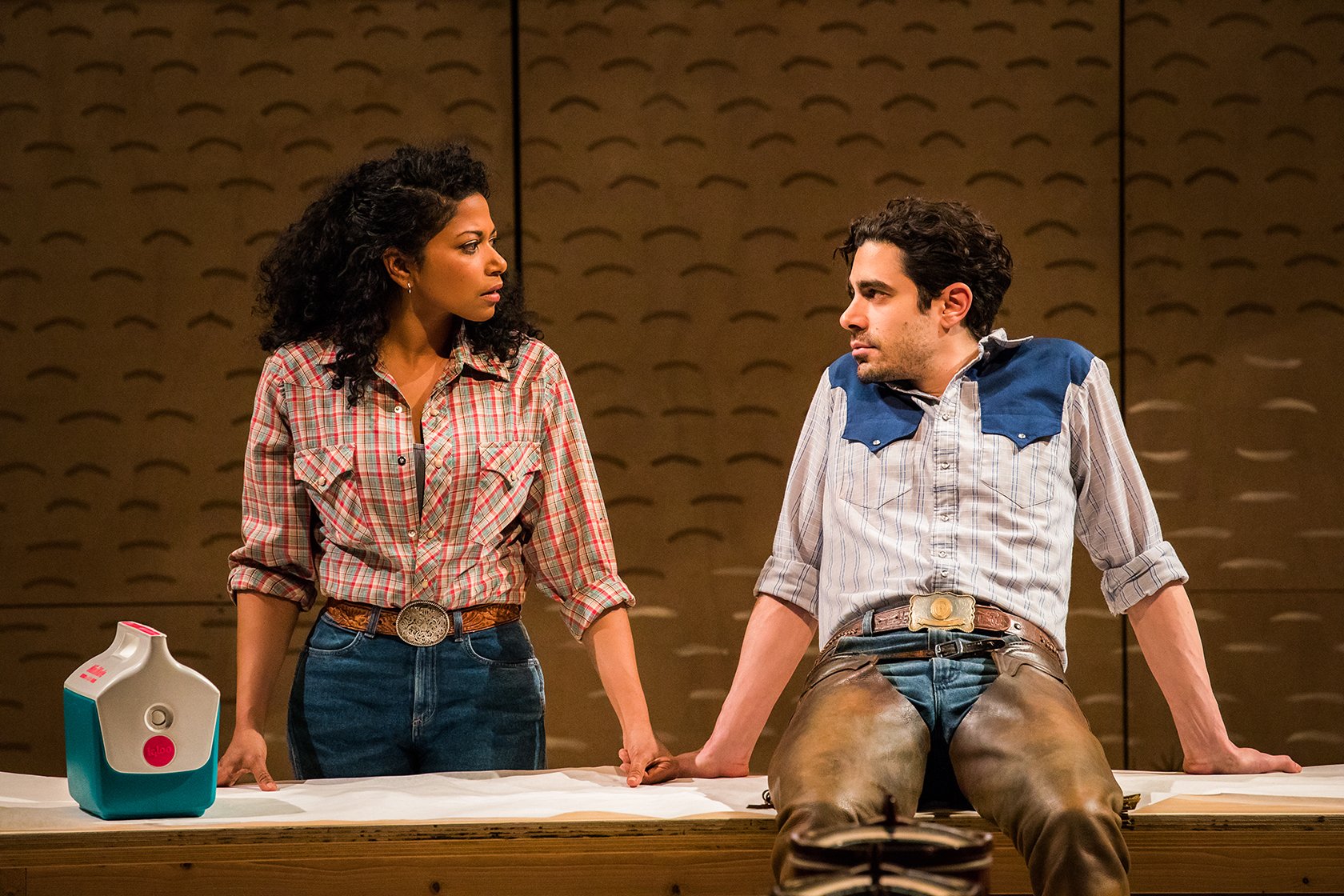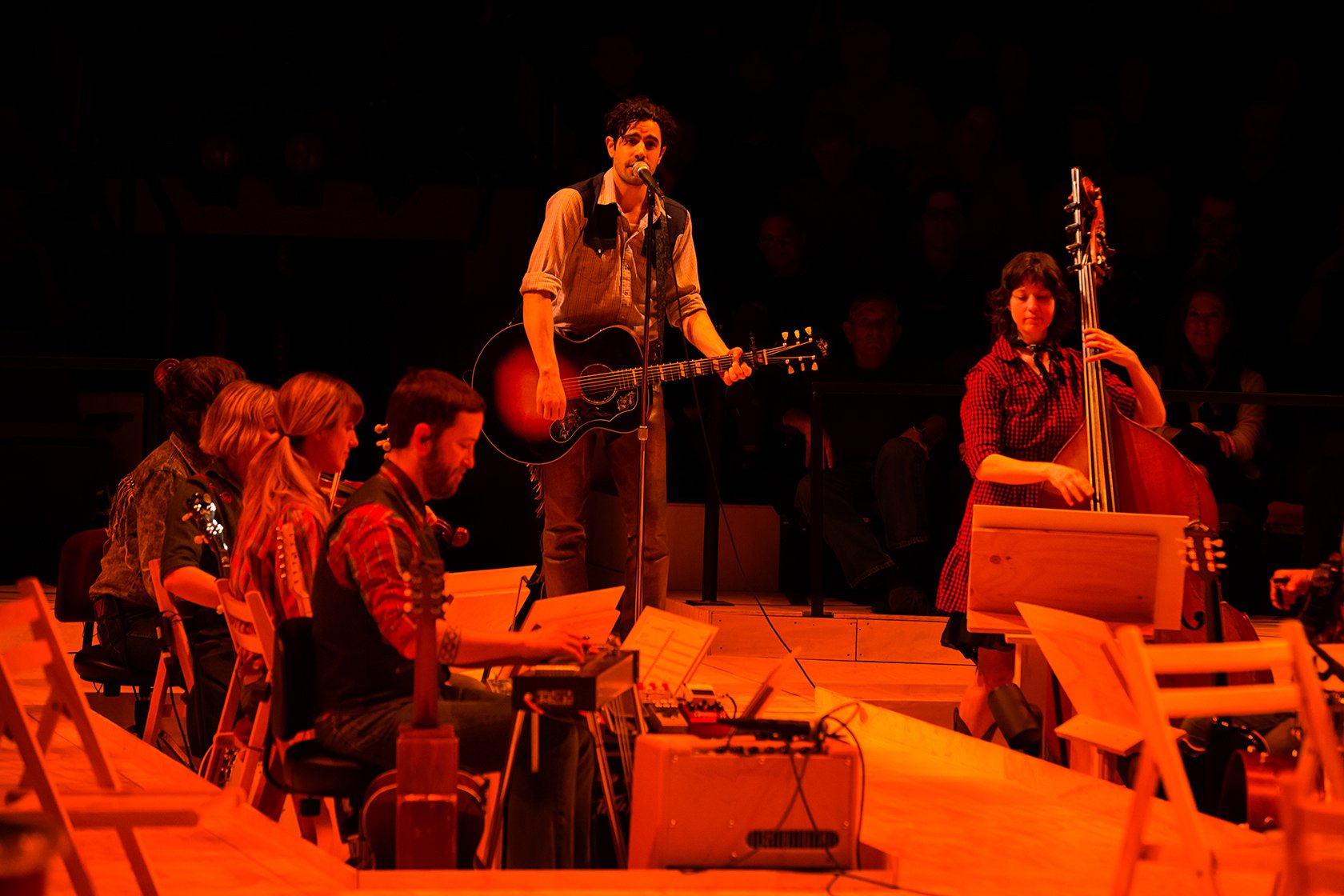Oklahoma! Broadway Dallas @ Winspear Opera House
—Jan Farrington
The woman by the elevator looked a bit grim.
“I’ve never seen the show before, or even the movie,” she said. “Was this…?”
“No,” I said. “This was a very different Oklahoma!”
On opening night of Broadway Dallas’ presentation, dozens of attendees bailed at intermission, leaving a noticeably thinned audience for Act Two.
An initial sense of audience good will toward this old warhorse of the American musical had faded by then, replaced by unease—and that was the intention.
Experimental director Daniel Fish’s desire to re-work the classic Rodgers & Hammerstein musical is theatrically understandable. This “new” Oklahoma! reflects something we all know: that the sunny national story we liked to tell ourselves back in the day (say, when we were actually saving the world) skimmed over a lot of darker history. Fish the iconoclast is hell-bent on de-construction, and won’t let us off the hook—and perhaps little more than one week after Uvalde, it could be said we deserve to look in that mirror.
“And the land we belong to is GRAND!” Near the end of the show, the sobbing, bloodied bride Laurey (Sasha Hutchings) screams out that line of the song, and then again, straight into the faces of the audience. As if to insist on the truth of it—or to challenge our common belief. When the rouser finale number “Oklahoma” leaves a nasty taste in your mouth, you know this isn’t your Grandma and Grandpa’s musical. Whether that’s a plus or minus will greatly depend on your own opinions.
But let’s find things to like. The show plants its feet on a single set by Laura Jellinek, the town hall of a rural ranching/farming town, backed by panoramic panels of an earth-toned, wide-open West. The hall is set with tables and chairs, strung with streamers and simple lights. For much of the stage time, then, the story (pot lucks, box socials, wooings, arguments, even an impromptu “trial”) plays out in the presence of the whole community. It really is everybody’s business, this pioneering stuff—a premise that carries weight, in a good way, from start to finish.
Daniel Kluger’s orchestrations, way more C&W and bluegrass than Broadway, are excellent, and played with heart by musician blended in as “just folks” (with instruments) toward the back of the stage. More than a few songs are paced noticeably slower, which works more often than not—and gives the show’s love songs in particular a thrumming sense of longing. (Perhaps one or two fewer “slow dances” might have been more effective.) Even Laurey’s future husband, ambitious young cowpoke Curly (Sean Grandillo has a good rockabilly voice) grabs a guitar now and then to accompany his songs.
In venues around and in New York City, where this Oklahoma! earned plenty of critical praise, there was a distinct effort to keep the audience close to the show. (In one theater space, they sat on three sides of the actors; in another, the crock pots of chili cooking onstage fed the audience at intermission.) This intimacy is lost in spaces like the Winspear, and it’s a pity—in part because the dialogue sometimes felt distant and muffled, though the songs came through. Distance also kept us from a full sense of the performances, which alternately seemed very broad, or so quiet as to be lost in the size of the hall.
Now then.
Director Fish correctly understands the dark underpinnings of Oklahoma-born writer Lynn Riggs’ story as Rodgers & Hammerstein adapted it. Though on the surface,the songs skew upbeat, romantic, or comical, this young country is rough and violent, hard on women (in every way) and on men who don’t “fit in.” And nobody’s ever heard the word “indigenous.” Oklahoma! has some of R&H’s darkest and most pitiless material.
So in digging deep for the stuff that’s usually skimmed over on the musical-comedy circuit, Fish can’t be considered out of line. It’s there, food for thought—not just on the drive home, but in bed trying to fall asleep, thinking about all the guns on that stage…and the one corpse, the orphan “hired man” Jud Fry (a quietly frightening Christopher Bannow). He’s the outsider nobody wants, and nobody mourns. “He kept to himself,” somebody must have said. “A quiet fella.”
Yet Fish eventually muddies the waters so thoroughly that toward the end, I clutched my head in my hands, something I’ve never done in a theater before. “Ask your heart what you really want.” “Wait for the answer.” And decide—make a choice. It’s a theme repeated by individual characters, by the ensemble, and in a “dream ballet” (danced edgily by Jordan Wynn to John Heginbotham’s modern choreography) in which Laurey tries to sort out her inchoate sexual attractions and desires. Yet does Laurey ever decide? Does she take hold of her life? If so, I missed it. And without that, her part of the story turns chaotic.
Fish plunges the Winspear into sudden total darkness at times, first for a close-to-the-mic exchange between Curly and Jud—with nice-guy Curly calmly suggesting Jud would be doing himself and everyone a favor by stringing himself up by the hook in his filthy shed. (Remember, that was always in there, pretty brutal.) As the lights come up a shade at a time, we find the two men sitting face to face, only a camera between them as they’re live-videoed and projected (Joshua Thorson’s design) on the back wall of the stage. Another episode of darkness (with banter between Laurey and Curly) ends with lights coming up Wicked green (Scott Zielinski’s coded colors make a strong statement)—and Jud, standing silently between them.
At one point, Laurey, dressed in denim and petticoats for the box social, stands like a passive doll at center stage. Her feisty words must not mean much—because here she is, doing nothing as two guys wrangle over her future. Even after her wedding to Curly, Laurey lets Jud give her a lingering kiss, then goes to hold Curly’s hand. My brain hurts. Is she an avatar of the young America, choosing between white-bread domesticity and bad-boy adventures?
This Oklahoma! clearly won’t be some people’s cup of sarsaparilla. It’s challenging, it’s mud in your eye, it’s wrenching, flawed, and interesting (sometimes intensely so). Not sorry I saw it, but once was enough.
WHEN: Through June 12
WHERE: Winspear Opera House
WEB: broadwaydallas.org

